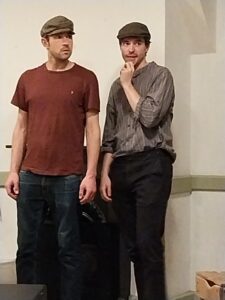News Article
Preview – A View from the Bridge
31 Oct 24
Janine Wunsche introduces her production of Arthur Miller’s classic, intense drama, set in New York’s Italian-American community in the 1950s.
This is a play you've wanted to direct for a long time - why?
When I first read this play, I was immediately struck by the intense power of the drama and actually felt my body start to shake. When I came to the concluding image at the interval, I knew I had to direct it. I was struck by the amount of really important questions the play raises, and it called to my heart and my mind in a way that few dramas do.
I loved the combination of gritty post-war Brooklyn and the Greek style structure. I discovered that the main character, Eddie Carbone, was based on a real longshoreman who lived and worked in Red Hook, Brooklyn. Miller was keen to write a dramatic tragedy, but originally wrote a shorter, quite stark, drama which was performed in New York. Later, when bringing the play to London he connected with director Peter Brook, and the play was expanded to include other characters including Eddie’s wife Beatrice. Miller claimed that with that expansion, he had now personally connected with the story.
I’m always drawn to theatre which is challenging to watch. This play reaches into the core of humanity and explores our flaws and their consequences. It feels brutally honest and without preaching it forces the audience to question their view on what’s right and wrong, on prejudice, on justice and injustice. The writing is superb with never a wasted word, it moves at lightning speed, and is always pulling us in. I am so grateful to be given the opportunity to grapple with this beast. It’s huge!
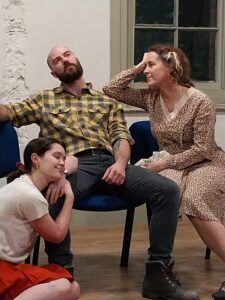
You mentioned the parallels with Greek tragedy - what themes does the play explore?
I’ve always been interested in Greek drama, especially the tragedies with their sense of destiny, a profound journey, and an inevitable outcome. A View From The Bridge shares that impetus, with two of the themes which constitute tragedy – ‘the fall from greatness’ and the ‘corruption of innocence’ both at the core of this play. Miller’s Greek-style tragedy is complete with a narrator/chorus in the lawyer Alfieri, but combined with a contemporary domestic story, so that it relates to ordinary people and yet holds the themes and power of an archetypal classic drama. The invasion of immigrants, sexual jealousy, corruption, betrayal, homophobia…and more. It invites us to think bigger!
Like all classic Greek tragedies it asks a lot of moral questions. Where is ‘the law’ when Marco is betrayed? Is Eddie in love with his virginal, teenage niece in the wrong way, or is he just an over-protective surrogate father? Is Rodolpho actually a gay man, and only after his passport and work papers, or does he really love Catherine? There’s the young stag/old stag dynamic of the two males fighting for power.
Beatrice now in menopausal years, is jealously watching the blossoming virgin steal her husband’s love. It’s very archetypal. At the same time, these are things which happen to us today. The ‘fatal flaw’ leads to the tragedy. Beatrice has a line which we’ve paid a lot of attention to: “Whatever happened here, we all dunnit”, exposing the truth that all the characters are flawed. and have in some way contributed to the inevitable outcome of the play. It’s a dramatically rich ‘hot mess’ – absolutely brilliant!
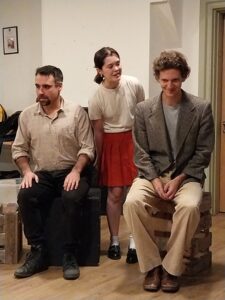
Tell us about the background to the play and the characters we'll meet
The play is set in Red Hook, a dockland area of Brooklyn, New York. Miller sets it after the war, at the beginning of the musical era of jive which later led to rock and roll, and the song Paper Doll is played during the show. The Red Hook district was made up of immigrants from various parts of the world. Most entered illegally and had to work on the docks to pay off their debt to the ‘traffickers’. The streets were not particularly safe, there were gangs, and Al Capone and his mob had been operating there not so long ago. Manhattan and wealth were just across the water, but the worlds didn’t mix much.
Our characters are all longshoremen and their families. working the piers and living in apartment blocks built for the purposes of housing the dock workers. All the main characters are Italian immigrants or their descendants. To live here legally with papers and citizenship you have to marry someone who was born in America. It’s a close-knit Italian community with its own rules and moral codes, sitting uneasily in the grubby corner of New York with its own legal American constitution; so the word Justice is at the heart of this drama. Is the Law correct? Whose law?
The main character Eddie Carbone (Calum Speed) lives here with his wife Beatrice (Polly Sands) and niece Catherine (Willa Main). Beatrice’s sister died when Catherine was tiny and she’s been raised by them; they have no children of their own. Now a teenager of 17, she’s offered a job, a big step towards being independent. Eddie, who adores her, struggles to accept that she is ready for the world outside.
Beatrice’s Sicilian cousins, Marco (Giorgio Galassi) and Rodolpho (Tom Hilton), arrive in Red Hook illegally and come to stay with the family. Marco wants to work to send money home to his starving family and sick child. Rodolpho is young, single and talented, and wishes to become an American, forever! Catherine is immediately attracted to him, causing more concerns for the over-protective Eddie, and he becomes obsessed with stopping their relationship, even consulting local lawyer Alfieri (Dante Frederick) to see what the law has to say. The philosophical Alfieri talks to the audience directly, with his personal involvement in the action providing a powerful link.
Other characters include fellow dock workers Louis and Mike (Tristan Plowman and William Weston), good friends of Eddie, but as his obsession increases, his connection to his friends diminishes, leaving him even more isolated.
The two immigration officers (Cherisse Coleman and Felix Fabiny) are also part of the community structure. Their job is to seek out and arrest illegal immigrants, but the community is bound by codes of silence, its own moral codes and internal justice system, sticking together in order to survive and to remain here.
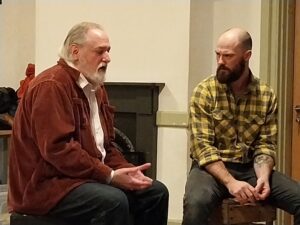
What have been the main challenges in directing this play?
As a director, I think the most exciting challenge has been to discover the fusion between the contemporary domestic drama and the archetypal Greek tragedy. You have to think on two levels all the time. Where are the connections between the ordinary domestic setting and situation and the powerful archetypal forces that seem to drive the drama along?
This challenge has also been there for the actors. They have had to get their minds, hearts and bodies around this, to make the huge leaps that this style of drama requires. It is not easy stuff. You have to create the ‘ordinary’ in an ‘extraordinary’ way. You have to make it greater. I think this bringing of the roots of drama up to the now is a brilliant gift to the future of theatre.
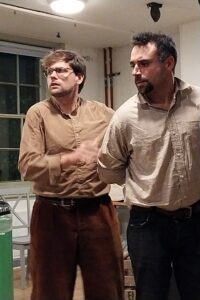
Give us three words to describe this drama?
Riveting, challenging, volcanic!
